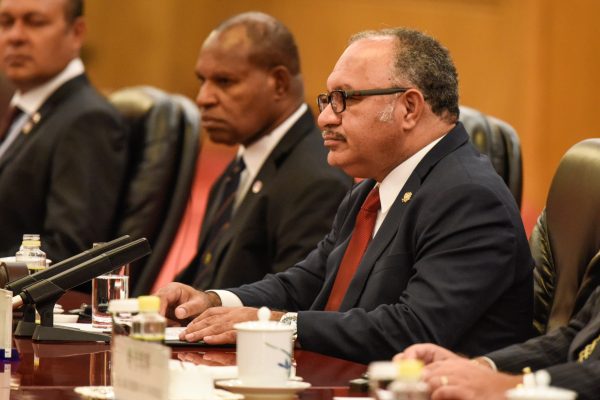When O’Neill was re-elected as prime minister of Papua New Guinea in August 2017 it looked as though he had consolidated his political leadership. Having controversially claimed the prime ministership in 2011, despite two Supreme Court decisions against him, O’Neill was legitimately elected head of government in 2012. He remained prime minister for the full parliamentary 2012–2017 term, becoming only the second prime minister to do so.
But in 2014 he was accused of corruption and an arrest warrant was issued against him. O’Neill managed to stave off his arrest through a series of legal manoeuvres. He was also referred by the Ombudsman Commission to the public prosecutor over a US$1.2 billion loan raised through Swiss-based financial company UBS, for which he had not sought parliamentary approval.
Despite growing calls for O’Neill to step down, the governing coalition held together. Following a Supreme Court intervention in July 2016 after the government had blocked four attempts by the opposition to introduce a no confidence motion, the subsequent motion ended up in O’Neill’s favour, 85 to 21.
In the 2017 national election, O’Neill’s Peoples National Congress (PNC) and several government ministers lost seats but O’Neill was re-elected prime minister, heading another coalition. Sam Basil and his opposition Pangu Party, the second largest in parliament, then crossed the floor to join O’Neill, as did several other parliamentarians. This gave the government a substantial majority.
Further strengthening his position, in December 2017 the Supreme Court, having quashed O’Neill’s referral to the public prosecutor over the UBS loan, ruled that the arrest warrant against O’Neill was ‘defective’ and void. With Papua New Guinea hosting the November 2018 APEC Summit, a successful state visit to China, and financial assistance flowing in from China, Australia, the United States and elsewhere, O’Neill’s star might have appeared to be in the ascendancy.
But the APEC Summit may have backfired for O’Neill. At a time of economic downturn and expenditure cuts, the lavish Summit, which had little impact beyond Port Moresby, drew widespread criticism.
O’Neill then came under renewed fire over the UBS loan. This followed reports that Swiss authorities were investigating whether it had violated local regulations, and additionally, there had been a leak from the Ombudsman Commission that reportedly suggested the government may have breached a number of laws.
Against this background, rumours had been circulating of tensions within the governing coalition.
Under the Constitution, an incoming government has a grace period of 18 months where it is free from a vote of no confidence. In this case, that would be until 5 February 2019. In late 2018, the opposition gave notice that it would submit a vote of no confidence. But when Parliament met in February 2019, the government voted to adjourn for three months following a motion by then finance minister and leader of government business, James Marape.
On 11 April, however, Marape announced his cabinet resignation citing differences with O’Neill over local participation in resource projects. This followed the signing of a US$13 billion natural gas agreement with foreign venture partners, in which Marape said he had been ignored. Marape — a long-time supporter of O’Neill — later defected to opposition. The then attorney general Davis Steven and nine other parliamentarians followed him.
By early May at least 24 parliamentarians had defected, including five ministers and the governors of five provinces. This fresh new opposition group, labelling itself the ‘Alternate Government’, claimed to have the numbers to pass a vote of no confidence.
Basil, the former opposition leader, remained with O’Neill and was rewarded with the finance portfolio. But the Pangu Party’s non-parliamentary executive supported the opposition and the 15-member parliamentary party split, with six parliamentarians identifying with opposition. Basil was expelled and became leader of a rejuvenated Melanesian Alliance Party.
A no confidence motion requires the naming of an alternative prime minister. On the eve of parliament resuming, Marape was named. But when Parliament met on 7 May, O’Neill’s tried and tested tactic to adjourn Parliament was carried 59 votes to 50. The opposition then attempted to oust the Speaker, but lost by the same margin. Parliament was set to meet again on 28 May.
Marape then reportedly withdrew his name, opening up the contest for prime ministerial nominations in the hopes of attracting more defections from the governing coalition. O’Neill’s buying of time then ended up for nought, as on 24 May the government’s United Resources Party coalition partner crossed to opposition, giving the ‘Alternate Government’ the majority it was seeking. On 26 May, O’Neill announced his standing down.
O’Neill was reported as saying he would hand over office to Sir Julius Chan, a former prime minister and former People’s Progress Party leader, a party in the coalition partnership. The Constitution, however, contains specific provisions including the requirement of a parliamentary vote and apparently, that an acting prime minister be a minister. Sir Julius is now Governor of New Ireland province, not a cabinet minister. There are, therefore, serious questions remaining about this leadership transition that will need to be answered as parliament meets over the coming weeks.
Dr Ronald May is an Emeritus Fellow of the College of Asia and the Pacific, the Australian National University.

